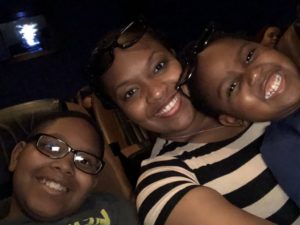Sometimes the weight of my children’s future paralyzes me. Hundreds of questions swirl around in my head making it difficult to remain calm:
Who will they become? Will they thrive without us around? How do I make sure they’re both good human beings? Have I missed any signs of hidden trauma?
Soon, the questions shift onto a different but equally important worry: Am I being overbearing? Am I “overparenting”? Will my hopes and expectations overwhelm them? Are we giving them the space to just be kids? Is life fun enough?
When I chose to become a mother, I considered what that meant with more intention and conviction than I had thought of anything before. I believed (and still do) that while there would definitely be unplanned experiences in parenthood, it would serve my children well if I had some basic tenets by which to parent.
Tenet One: My children are people.
Duh, right? Of course they are. But, that statement means more to me than the obvious observation. It is extremely important that my husband and I treat our children with respect. That extends from the way we speak to them to accepting when they aren’t interested in hugging someone. Teaching autonomy from the beginning, mattered. Their bodies are their own. Their space is their own. Validating their emotions, especially frustration and anger, is key. Hearing “it’s OK to be mad,” matters as much as “let’s talk about some options when you’re ready.” Exploring the range of emotions with supportive parents as guides helps build more emotionally intelligent young adults.

I grew up hearing that children shouldn’t question adults, shouldn’t speak unless spoken to, should stay in a “child’s place,” and so on. I want something different for my own children. My home should be a place where they can question things they don’t understand, which means I need to have actual reasons for rules. I disliked “because I said so” as a child, so I commit to not using that as a parent. It’s hard sometimes, but it’s still important.
Tenet Two: My children have a voice.
Allow me another moment to state the obvious: Children learn to voice their desires, opinions, and thoughts early in life, so the earlier I could amplify my children’s views, the better. It started with little things, like what kind of fruit they wanted, and graduated to the types of clothing they wanted to wear. Now, they’re giving us feedback on the type of schools they’d like to attend.
Teaching in schools taught me how few students had enough experiences to develop their own voice and the confidence to share their thoughts. I can’t count the number of times a student asked, “But what do you want me to say here, Miss?” Many wide-eyed faces stared back at me when I assigned open-ended projects that required students to make most of the decisions. By making all the decisions for children, adults missed valuable opportunities to teach students how to do it themselves. I intended to do it differently in my classroom as well as at home with my own little ones.
It is our responsibility to guide our children through the decision-making process at their various developmental stages. One of the most valuable lessons for our oldest continues to be, “Though you may share your voice, it may not change our decision.” It’s a crucial one for him to learn early. Our priority remains ensuring that he knows how to articulate his thoughts effectively.
Tenet Three: My children can learn.
Yes, that’s right. They can learn anything. Whatever their little hearts desire to know, we find a developmentally appropriate way to teach them. I was never a fan of limiting children’s access to information and knowledge. Instead, we challenge ourselves to make complex concepts digestible. We feed their hunger for knowledge, and in turn, we get to watch them blossom in different environments, making connections across concepts and contexts. When our oldest was five, he asked me, “Mom, do you think the earth is past its golden age?” and proceeded to explain what he meant in case I was unaware. Some months later, we were watching a movie together. He recalled a bit of Greek mythology he’d learned and questioned why Kronos was behaving so negatively toward humans. We ended up chatting about different religions and the similarities to what he was learning at the Catholic school he was attending.
The sky should be the limit for my children, and we try to parent in a way that allows them to explore across disciplines. Even if they aren’t ready to comprehend fully, each new addition of information creates another connection to be cultivated later. Exposure, exposure, exposure.
Of course, the list has grown over the years, but those three ideals have and continue to serve me well on this motherhood journey. We have plenty of silly moments and spontaneous fun. But, I am committed to parenting with a specific goal in mind. I want to raise ethical human beings who value learning, love, and living. I can’t answer the multitude of questions that worry me, but I find comfort in our lived experiences. It’s a hard, long road, this mothering thing. But I’m working it.











